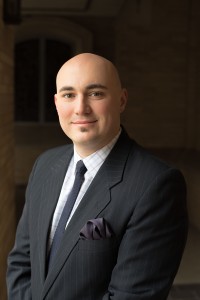 I am a PhD candidate in New Testament and Christian Origins at the University of Edinburgh. I have also completed doctoral coursework toward a PhD in Religious Studies in Judaism and Christianity in Antiquity at Marquette University. I currently serve as a Religion Teacher at St. Anthony School in Milwaukee, Wisconsin, a private Catholic school in the Archdiocese of Milwaukee. For five years prior, I served as the Religion and Theology Specialist for the Educational Opportunity Program at Marquette University, a federal TRIO program to support first generation low income college students. I have served as a graduate teaching assistant and research assistant in the Department of Theology at Marquette. I am a two time graduate of Criswell College in Dallas, Texas with my BA in Biblical Studies and my MA in Theological and Biblical Studies. I have also studied at Tantur Ecumenical Institute of the University of Notre Dame in Jerusalem, Israel and a summer term at the University of Oxford. I am currently a student member of the Society of Biblical Literature, the Catholic Biblical Association, Chicago Society Biblical Research, the Enoch Seminar, the North American Patristics Society, the European Association of Biblical Studies, and the American Academy of Religion. My work has been published with Fortress Academic/Lexington Press and in the Journal for the Study of Paul and His Letters.
I am a PhD candidate in New Testament and Christian Origins at the University of Edinburgh. I have also completed doctoral coursework toward a PhD in Religious Studies in Judaism and Christianity in Antiquity at Marquette University. I currently serve as a Religion Teacher at St. Anthony School in Milwaukee, Wisconsin, a private Catholic school in the Archdiocese of Milwaukee. For five years prior, I served as the Religion and Theology Specialist for the Educational Opportunity Program at Marquette University, a federal TRIO program to support first generation low income college students. I have served as a graduate teaching assistant and research assistant in the Department of Theology at Marquette. I am a two time graduate of Criswell College in Dallas, Texas with my BA in Biblical Studies and my MA in Theological and Biblical Studies. I have also studied at Tantur Ecumenical Institute of the University of Notre Dame in Jerusalem, Israel and a summer term at the University of Oxford. I am currently a student member of the Society of Biblical Literature, the Catholic Biblical Association, Chicago Society Biblical Research, the Enoch Seminar, the North American Patristics Society, the European Association of Biblical Studies, and the American Academy of Religion. My work has been published with Fortress Academic/Lexington Press and in the Journal for the Study of Paul and His Letters.
My research interests include early Jewish apocalyptic and mystical traditions found within the reception and interpretation of scripture in the Second Temple period. My work seeks to demonstrate the integral role these traditions play in the study of Christian origins in the wider context of the ancient Mediterranean. The concentrations of my research in Judaism and Christianity in antiquity include the origins and development of deification and angelomorphic traditions, Messianism and “Christology,” and apocalyptic eschatology and resurrection beliefs. My research agenda focuses on tracing these streams of tradition in Second Temple Jewish literature, Pauline literature and thought, Luke-Acts, and the exploration and (re)description of the “parting of the ways” between early Judaism and Christianity.
My dissertation is tentatively entitled, “Resurrection and the Death of the Gods: Rival Jewish Reception of the Patriarchal Promises and the Argument of 1 Corinthians 15.”
My graduate thesis was in the field of Hebrew Bible and Ancient Near Eastern Literature, entitled: “Abraham’s Star-Like Seed: Neglected Functional Elements in the Patriarchal Promise of Genesis 15.” To request a copy, email me at david.burnett@marquette.edu.
My first peer reviewed publication can be found in the 5.2 volume of the Journal for the Study of Paul and His Letters entitled, “‘So Shall Your Seed Be’: Paul’s Use of Gen 15:5 in Rom 4:18 in Light of Early Jewish Deification Traditions.” To request a copy, email me at david.burnett@marquette.edu.
My first book chapter is entitled, “A Neglected Deuteronomic Scriptural Matrix for the Nature of the Resurrection Body in 1 Corinthians 15:39-42,” featured in Scripture, Texts, and Tracings in 1 Corinthians, edited by Linda L. Belleville and B. J. Oropeza, published by Fortress Academic/Lexington Books. To purchase a copy, click here.
My CV can be viewed here.
I have been featured on multiple episodes of The Naked Bible Podcast, the podcast of my outside MA thesis reader and dear friend, Dr. Mike Heiser, Scholar-in-Residence at Logos Bible Software. You can find them here.
You can add or follow me on Academia, Humanities Commons, ResearchGate, Facebook, and Twitter.
For strictly academic related correspondence, you can contact me here:
david.burnett@marquette.edu
For speaking engagements, booking info/requests, etc., you can contact me here:
dburnett51@yahoo.com



HI David! Don’t know if you remember me or not, but I’m Kat Watson’s Mom from Great Hills. You’ve come a long way and I’m thankful to say that you have become a testimony of encouragement to me and some of the staff here at ACSI HQ (International Ministries). I remember how you use to let me know your GPA status and I would feel so encouraged for you, with you, and for myself. You’ve come a long way and I’m so greatful to our Lord for His advancement in your life. Keith and I have been praying for your hearts desire. May the Lord continue to bless you, keep you healthy, and in good favor with God and man.
Thank you so much! Of course I remember you! I am trusting in God to advance my studies. I am about to finish my BA in Biblical Studies this month and in the summer I will be starting my MA in Biblical and Theological Studies (concentrating in OT interpretation in the second temple period as a background for a PhD in NT or Biblical Theology). I am excited. I am praying for finacial support right now for my masters work so i can focus on my studies. You can pray for that for me. I cannot thank you enough for praying for me it means so much. God bless you guys and love you. In Him we have the promise of vindication through resurrection and to take part in works of new creation in the present. May we be found faithful on that day. In Christ,
David A. Burnett
Hey David,
Found your blog and blogrolled you. You’re a talented writer.
MM
Hello, Mr. Burnett
I am a college student pursuing a bachelor’s in history and an associate’s in theology. Yours is the first website where I have heard of Jewish “angelomorphism” as a concept although I have studied the (mostly) Orthodox concept of theosis. I am intrigued that this idea was expressed in the first century by grouping together the “sons of God” and divine “holy ones” in the Divine Council with the “holy ones” that would be chosen among the human race.
St. Augustine, I think, had postulated that mankind was created to replace the one third of the angels who fell. Do you think he got this idea from Jewish angelomorphic beliefs?
Thanks.
Hello Petrarch,
I am not well versed in Augustine, so I would be inadequate to answer whether Augustine was aware of Jewish angelomorphic traditions. Though having said that, he is by default acquainted with it through explicit texts such as the Gospel of Matthew where Jesus says “For in the resurrection they neither marry nor are given in marriage, but are like angels in heaven (Matt 22:30).” Another might be 2 Peter 1:4 “For by these He has granted to us His precious and magnificent promises, so that by them you may become partakers of (the) divine nature, having escaped the corruption that is in the world by lust.” These are a few explicit texts amongst a sea of implicit ones in the NT. It makes sense from the book of Daniel how he could get that particular interpretation especially in light of Daniel 7’s use of the term “holy ones (7:21, 22, 25, 27)” for faithful Israel (or those faithful to YHWH), Daniel 8’s use of the host of heaven who were thrown down as “stars (8:10),” and then presumably the faithful being referred to as “those who lead many to righteousness (12:3)” who will inevitably “shine brightly like the expanse of heaven… like the stars forever and ever (12:3),” which could easily be interpreted as the replacement of the fallen hosts in 8:10 as divinely exalted humans upon the resurrection (which is the interpretation I take as well). This would make sense of the use of much of the astral language in the NT as well as other apocalyptic Second temple Jewish texts. I am doing my thesis on what I think the origin of this astral language is (won’t let the cat out of the bag just yet).
The type of things I discuss in the not-yet-perfected Colossians posts posted here on the blog were adapted from a paper I did in my Early Jewish Christology and Monotheism seminar I took with Dr. Daniel Streett at the Criswell College. I do believe this type of thinking is the origins for the eastern concept of theosis.
Thanks for your interest. It is rare that many are interested in early Jewish and Christian angelomorphic or theotic tradition, either because they simply don’t see it there or because it sounds to mythic and eastern as children of their scholarly patriarch, Bultmann ;-).
Happy studies,
David A. Burnett
David
How can I get copies of your papers?
“Abraham’s Star-Like Seed: Neglected Functional Elements in the Patriarchal Promise of Genesis 15.”
“‘So Shall Your Seed Be’: Paul’s Use of Gen 15:5 in Rom 4:18 in Light of Early Jewish Deification Traditions.”
“A Neglected Deuteronomic Scriptural Matrix for the Nature of the Resurrection Body in 1 Cor 15:39-42?”
Hello Allen,
Email me at dburnett51@yahoo.com with your request.
Thanks,
David
Just heard you on the latest Naked Bible podcast. You describe a particular issue you have with N.T. Wright on his view of resurrection. Could you flesh that out a little or point me in the direction to wrestle with another viewpoint. I just finished his Resurrection of the Son of God and found it very robust.
Thank you
Wow I have been enjoying your exposition at nakedbible podcast, please include me on this blog and your emailing list .
Praying and loving, the work you do too
Hi David,
I really enjoyed you on the Nakebible podcast. How would I be able to get in touch with you if I had personal questions
Hi David,
Looking forward to following you after hearing your episodes on the NBP. The work on Paul is intriguing in addition to all the other theology that you and Dr Mike are working on. I’m curious to find other theologians and scholars along the same track – starting with you – and not sure where to start other than the bibliography in Mike’s books. Any suggestions?